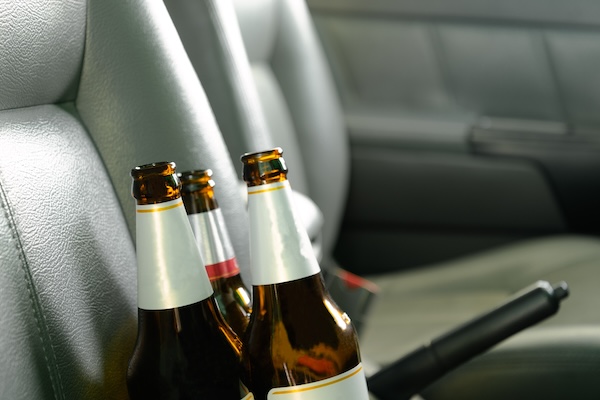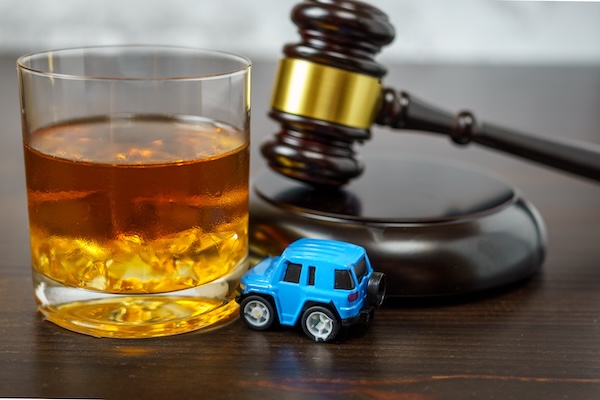Caught with a Bottle in the Trunk? What Every Driver in Asheville Needs to Know
Transporting alcohol in your vehicle can be a confusing issue, especially when it involves an open bottle. Many drivers are unsure about the laws surrounding open containers and whether it’s legal to carry an open bottle of alcohol in the trunk of their car under North Carolina law. Understanding these laws is crucial to avoid unnecessary fines, legal complications, or even more severe charges such as driving under the influence (DUI).
In this blog, we’ll explore whether it’s legal to drive with an open bottle of alcohol in the trunk, clarify key points of open container laws, and highlight the consequences of violations, while also emphasizing the importance of working with an experienced Asheville DUI lawyer if you find yourself facing alcohol-related charges.
Understanding Open Container Laws
Open container laws are crucial regulations that help maintain public safety on the roads by prohibiting drivers and passengers from having access to open alcohol while in a motor vehicle. Violating these laws can lead to fines, penalties, or even more severe legal consequences depending on the situation. This section will break down the key components of open container laws so that you can better understand how they apply to you.
What is Considered an Open Container?
An open container refers to any open bottle, can, or container of an alcoholic beverage that has had its seal broken or has been partially consumed. This applies to all types of alcoholic beverages, including beer, wine, and spirits. For example, a half-finished open bottle of wine or a beer with the cap removed would be considered an open container under the law. It is essential to recognize that even if the alcohol has not been consumed while driving, possessing an open container in the passenger area can still lead to legal trouble.
Defining the Passenger Area
The passenger area is defined as any space within the vehicle that is accessible to the driver or passengers while seated, including the passenger seat. This includes the front and back seats, as well as the glove compartment and other storage areas within reach. The law is designed to prevent easy access to alcohol during transit. Importantly, the passenger area excludes parts of the vehicle that are not accessible while driving, such as the trunk or the area behind the last row of seats in an SUV or station wagon. Keeping alcohol in these inaccessible areas is typically allowed.
Exceptions to Open Container Laws
While open container laws are generally strict, there are exceptions. Beverages must remain in the manufacturer’s original sealed container to avoid being classified as an open container. For instance, open containers are permitted in certain types of vehicles-for-hire, such as taxis, limousines, or buses, as long as the driver has no alcohol in their system. Another exception applies to motor homes or house trailers, where open containers are allowed in designated living areas, not within the driver’s reach. However, it is crucial to check specific local laws as these exceptions can vary depending on jurisdiction.
Is It Legal to Drive with an Open Bottle in the Trunk?
Transporting alcohol in a vehicle can be tricky, especially when it’s an open bottle. This includes both fortified and unfortified wine, which are subject to open container laws. Many drivers are unsure of the legality surrounding carrying open containers in their cars. Below, we will clarify the rules for driving with an open bottle in the trunk, based on general regulations and exceptions.
Transporting Alcohol in the Trunk
In most jurisdictions, it is legal to drive with an open bottle of alcohol as long as it is stored in an area of the vehicle that is not accessible to the driver or passengers. This includes malt beverages, which are subject to the same regulations. The trunk is considered a secure and inaccessible location, making it a legal option for transporting open containers. This ensures that the alcohol is not readily available during transit, reducing the risk of consumption while driving.
Alternative Storage Areas in Vehicles Without Trunks
For vehicles without a traditional trunk, such as hatchbacks, SUVs, or station wagons, the law typically allows open containers to be stored in the area behind the last row of seats. This section of the vehicle is also considered out of reach for the driver and passengers. However, storing alcohol in this space must still prevent easy access from within the passenger area. It’s essential to place the open bottle as far away as possible to avoid violating the law.
Why This Law Exists
The law surrounding open containers in vehicles is designed to prevent drivers and passengers from accessing alcohol while the vehicle is in operation. Mixed beverages, along with other types of alcohol such as malt beverages and fortified wines, are subject to specific legal restrictions regarding their transportation and consumption in motor vehicles. By keeping the open bottle in the trunk or another inaccessible area, the temptation to consume alcohol during transit is removed, reducing the likelihood of dangerous driving behaviors such as impaired driving or distracted driving.
Exceptions to the Open Container Law
Although open container laws in North Carolina are designed to prevent the consumption of alcohol while driving, there are certain situations where these rules do not apply. These exceptions provide some flexibility, depending on the type of vehicle, location of the alcohol, and circumstances. Here’s a breakdown of the most common exceptions to open container laws.
Vehicles-for-Hire
One of the primary exceptions to the open container law applies to vehicles used for hire. This includes taxis, limousines, buses, and other commercial transportation services. In these vehicles, passengers are allowed to have open containers of alcohol as long as the driver is not drinking and has no alcohol in their system. This exception acknowledges the difference between private vehicle use and professional transportation services, where passengers may be engaging in social activities.
Living Quarters of Motor Homes
Another notable exception is for motor homes, house trailers, and similar vehicles. Open containers are allowed in the living quarters of these vehicles. Since these areas are separate from the driver’s space and are intended for temporary living, the law permits the transportation of open alcohol containers within this designated area. However, this exception only applies to areas not easily accessible from the driver’s seat.
Types of Alcohol
In some cases, the type of alcohol being transported affects whether an open container is allowed. For instance, many jurisdictions permit open containers of low-alcohol beverages such as beer and unfortified wine in the passenger areas of certain vehicles. However, open containers of spirituous liquors and fortified wines, which have higher alcohol content, are typically prohibited in any passenger area. This distinction aims to minimize risk while allowing some leniency for less potent alcoholic beverages.
Consequences of Violating Open Container Laws
Violating open container laws, classified as a misdemeanor open container offense, can lead to a range of legal consequences, depending on the circumstances surrounding the offense. These penalties are designed to deter individuals from carrying or consuming alcohol in vehicles, ensuring public safety on the roads. Below, we will outline the potential consequences you may face for violating these laws.
Infractions for Non-Drinking Drivers
If you are caught with an open container in the passenger area of your vehicle but have no alcohol in your system, the violation is generally classified as an infraction. A conviction for this infraction can lead to a permanent criminal record. Infractions are non-criminal offenses, and the consequences typically include a fine, often around $100, along with any associated court costs. While this type of violation does not result in jail time, it can still have implications for your driving record and insurance rates.
Misdemeanor Charges for Drinking Drivers
If you are found with an open container in your vehicle and have alcohol in your system, the consequences become more severe. In this case, you could face misdemeanor charges. Drivers charged with open container misdemeanors are required to submit to a breath or blood test to determine their blood alcohol concentration. A Class 3 misdemeanor is often issued for first-time offenders, and it may carry penalties such as fines, probation, and possibly up to 20 days in jail. For repeat offenders, the charge could escalate to a Class 2 misdemeanor, with penalties that include up to 60 days in jail, larger fines, and stricter probation requirements.
Impact on Driving Record and License
In addition to fines and potential jail time, open container violations can also affect your driving record. In many jurisdictions, these violations are considered moving violations, which means that points may be added to your driver’s license. Accumulating too many points can result in higher insurance premiums and, in some cases, the suspension or revocation of your driver’s license. Repeat offenses or refusal to comply with breathalyzer tests can lead to longer suspensions, typically ranging from six months to a year.
DUI Charges and Increased Penalties
If you are caught driving under the influence of alcohol in conjunction with an open container violation, the penalties become significantly more severe. For third or subsequent convictions, the consequences are even more stringent, often leading to mandatory license revocation and escalating repercussions. DUI charges can lead to prison time, substantial fines, and long-term impacts on your criminal record. In addition to the penalties for DUI, the presence of an open container can add to the severity of the charges, potentially increasing jail time or the length of your license suspension.
Why Choose Asheville DUI Guy for Your Alcohol-Related Charges?
When you’re facing an open container violation, DUI, or any alcohol related charges in Asheville, North Carolina, the attorney you choose can make all the difference. At Asheville DUI Guy, we focus exclusively on defending drivers charged under North Carolina law—and we know how to protect your rights, your record, and your future.
Here’s why clients across Buncombe County trust us:
- Local Expertise That Matters
North Carolina’s open container laws are nuanced, especially when it comes to questions like whether an open bottle or open can in the trunk or glove compartment is legal. We’ve handled hundreds of cases right here in Asheville and know how local courts interpret these laws. - Aggressive Defense Against Serious Penalties
Even a misdemeanor open container offense can lead to a permanent criminal record, driver’s license issues, or subsequent convictions with much harsher penalties. We fight to reduce or dismiss charges—so a simple mistake doesn’t derail your future. - Personalized Strategy for Every Case
No two cases are the same. Whether you were pulled over with mixed beverages in the cup holders or accused of consuming alcohol in a motor vehicle, we tailor a defense strategy based on the specific facts and legal angles available to you. - Clear Communication. Real Results.
From your first consultation to the final verdict, we keep you informed, involved, and empowered. You’ll never feel in the dark about where your case stands.
When your reputation, job, or driver’s license is on the line, don’t gamble on generic legal help. Trust the firm that knows how to challenge blood tests, dispute probable cause, and navigate alcohol-related legal gray areas.
Contact an Experienced Asheville DUI Attorney Today!
If you’re facing charges related to open container violations or any alcohol-related offenses, it’s crucial to get the right legal help. Our team at Asheville DUI Guy is experienced in handling these types of cases and can provide you with the guidance and representation you need.
Contact us at 828-759-5556 for a free case consultation!







